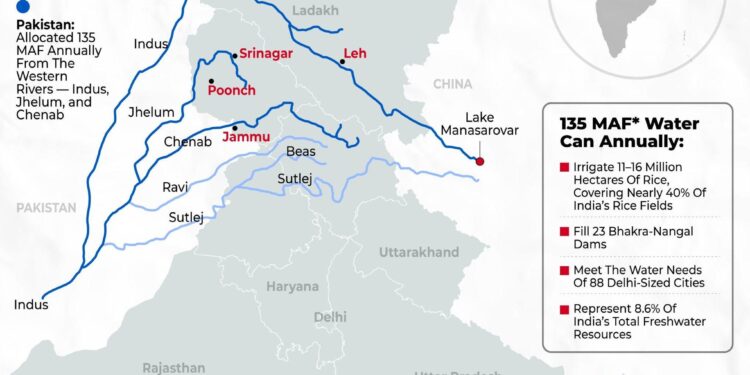What Are the Consequences of the Indus Water Treaty Suspension for South Asia?
Amid escalating tensions between India and Pakistan, the longstanding Indus Water Treaty—established in 1960 as a vital framework for water sharing—is currently at a standstill. Both countries face mounting challenges from climate variability, unpredictable water availability, and deep-rooted geopolitical conflicts. This impasse threatens to disrupt not only bilateral relations but also regional stability across South Asia. Experts warn that halting cooperation under this treaty could worsen humanitarian conditions, spark new disputes over resources, and undermine water security for millions dependent on these rivers. This article explores how freezing this critical agreement might impact agriculture, economic growth, and diplomatic ties within an already fragile region.
Challenges to Regional Water Security and Cooperation Amidst Treaty Freeze
The suspension of active collaboration under the Indus Water Treaty has intensified concerns about sustainable water management across South Asia—a region where climate change effects are increasingly pronounced alongside rapid population growth. The Indus River Basin remains indispensable to both India and Pakistan, supporting agriculture, drinking supplies, and livelihoods for over 300 million people combined. Without effective coordination through the treaty mechanisms, competition over these shared waters risks escalating tensions further.
Key consequences stemming from this freeze include:
- Escalating Diplomatic Strains: Disputes over dwindling water resources may heighten political friction between neighboring states.
- Agricultural Setbacks: Reduced river flows threaten crop yields—potentially aggravating food insecurity issues already documented by recent studies.
- Public Health Concerns: Limited access to clean freshwater sources could increase vulnerability to disease outbreaks.
In addition to immediate impacts on resource allocation, long-term regional cooperation stands at risk. The absence of joint governance frameworks may push countries toward unilateral actions that fragment efforts toward sustainable management of transboundary watersheds.
Despite current obstacles, several pathways remain promising for restoring collaboration:
- Sustainable Resource Management Initiatives: Crafting agreements focused on ecological preservation while balancing human needs can help maintain basin health.
- Regional Dialogue Platforms: Establishing regular forums encourages transparency around equitable distribution and environmental stewardship.
- Technological Collaboration: Sharing innovations in irrigation efficiency or advanced purification methods can optimize limited supplies amid growing demand.
Economic Fallout: Agriculture and Industry Under Threat from Frozen Waters
The halt in treaty operations poses severe risks not only environmentally but economically throughout South Asia’s agrarian-dependent economies. In Pakistan alone—where approximately 70% of workers rely directly or indirectly on farming—the disruption of reliable irrigation from the Indus River could trigger widespread soil degradation and crop failures with cascading social consequences such as increased poverty rates and heightened food insecurity.Recent audits highlight vulnerabilities linked to resource mismanagement affecting vulnerable populations.
Additional economic repercussions include:
- Agricultural Sector Rivalries: Intensified competition among farmers may lead to inefficient use or even conflict over scarce water allocations.
- Surcharges on Food Prices: Scarcity-driven inflation threatens affordability of staple crops across urban centers reliant on rural production zones.
- Migratory Pressures: Rural inhabitants facing livelihood losses might migrate en masse towards cities seeking alternative employment opportunities—exacerbating urban infrastructure strains.
Industries heavily dependent on steady water supply—including textiles manufacturing—which accounts for a significant portion of export revenues—and food processing units will likely encounter operational disruptions due to inconsistent access.
| Sector | Likely Impact | |||||||
|---|---|---|---|---|---|---|---|---|
| Agriculture | Diminished harvests leading to increased hunger risks | |||||||
| Textile Manufacturing | Dropped productivity causing revenue losses | |||||||
| Canned & Processed Foods | Curtailment in output with rising costs>Construction Projects Delays due to insufficient water supply
| Trust-Building Measures< / th > | Illustrative Examples< / th > | < tbody >< tr >Collaborative Research Efforts< / td > | Joint scientific studies assessing hydrological trends & climate impacts.< / td >< tr > | Routine Consultations< / td > | (Annual summits/workshops reviewing progress & challenges).< / td >< tr > | Community Outreach Programs< / td > | (Educational initiatives promoting conservation practices among citizens).< / td > |
|---|
By prioritizing these strategies within a cooperative framework emphasizing transparency & mutual benefit , stakeholders can better navigate complex disputes while advancing regional peace .
Conclusion: Navigating Uncertain Waters – The Future Outlook For South Asian Cooperation
South Asia now faces an urgent crossroads where continued suspension of one its most critical transboundary agreements threatens far-reaching socio-economic instability beyond mere territorial disagreements.
As climate change intensifies pressures upon finite freshwater reserves amidst burgeoning populations exceeding 1.8 billion people,[1] the imperative grows stronger than ever before—to resolve contentious issues surrounding equitable sharing through dialogue rather than discord.
Sustaining agricultural productivity while safeguarding industrial viability depends heavily upon renewed commitment toward collaborative governance models that balance national interests with collective welfare goals.
Ultimately, the trajectory chosen will set important precedents—not just locally but globally—for managing shared natural resources peacefully within some of Earth’s most densely inhabited regions.
—
[1] United Nations Department of Economic and Social Affairs (UN DESA), World Population Prospects 2023 Revision















